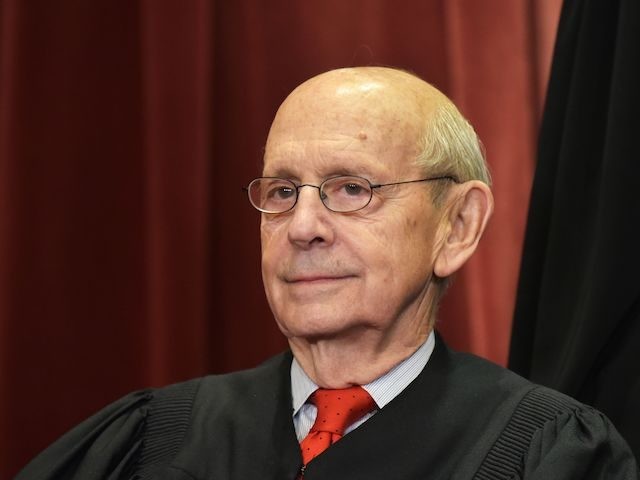Justice Stephen Breyer, widely known as one of the three liberal justices on the Supreme Court, warned against left-wing calls to pack America’s highest court with additional justices in order to weaken the conservative majority, explaining during a Tuesday Harvard Law School address that it would “diminish” confidence among the American people.
Breyer delivered the remarks on Tuesday in an address in which he said he aimed to “make those whose initial instincts may favor important structural or other similar institutional changes, such as forms of ‘court-packing,’ think long and hard before embodying those changes in law.”
The implications, the 82-year-old justice said, would be great and undermine the American people’s confidence in the courts and “in the rule of law itself.”
“If the public sees judges as ‘politicians in robes,’ its confidence in the courts, and in the rule of law itself, can only diminish, diminishing the court’s power, including its power to act as a ‘check’ on the other branches,” Breyer explained.
Breyer also appeared to dismiss characterizations of a hyper-partisan court, which liberals say stands 6-3 in favor of conservatives, but which conservatives say is still shaky on whether the Court has a consistent conservative majority at all. However, the justice noted that the Court famously refused to hear cases related to the highly contested 2020 presidential election — a telling sign, in Breyer’s mind.
“The court’s decision in the 2000 presidential election case, Bush v. Gore, is often referred to as an example of its favoritism of conservative causes,” Breyer explained. “But the court did not hear or decide cases that affected the political disagreements arising out of the 2020 Trump v. Biden election.”
As Breitbart News reported, Justice Clarence Thomas and other conservative justices voted to hear these cases, excoriating his colleagues like Breyer for refusing to consider the legal arguments they presented.
“It did uphold the constitutionality of Obamacare, the health care program favored by liberals,” he continued, referring to a 5-4 decision by the Supreme Court in 2012, during a time when few people would have said the Court had a conservative majority at all.
“It did re-affirm precedents that favored a woman’s right to an abortion. It did find unlawful certain immigration, census, and other orders, rules, or regulations, favored by a conservative president,” he said.
Because of the nature of these rulings, favoring the political left at times and right at others, Breyer said it convinces him that “it is wrong to think of the court as another political institution.”
Ultimately, he said the court’s authority is built on “a trust that the court is guided by legal principle, not politics.”
“Structural alteration motivated by the perception of political influence can only feed that perception, further eroding that trust,” he added.
The left’s calls to pack the court increased exponentially as former President Trump nominated now-Justice Amy Coney Barrett to replace the late-Justice Ruth Bader Ginsburg, weeks before the presidential election. President Biden, who was a candidate at the time, played it coy, failing to reveal if he supported the concept of expanding the Supreme Court, although he ultimately said he is “not a fan” of the concept.
“Well, I’m not a fan, it depends on how this turns out, not how he wins, but how it’s handled,” Biden said of Barrett’s confirmation during an October town hall with George Stephanopoulos. Even so, he struck a demonstratively different tone than he did in 2005, where he described court-packing as a “power grab.”
Notably, the late-Justice Ruth Bader Ginsburg also rejected the notion of court-packing.
“It would make the Court look partisan,” Ginsburg told National Public Radio’s Nina Totenberg in 2019.
Democrats tried court-packing once before, when President Franklin Roosevelt pushed legislation expanding the Court to 15 justices. The idea was wildly unpopular, leading to enough congressional Democrats siding with Republicans to defeat the power grab, and Democrats paid a very steep price in the 1938 midterm elections.
But a couple of justices on the Supreme Court at the time misread the politics of the situation, switching their votes in 1937 from previous cases on key constitutional limits on the federal government, opening the door to massive expansions of federal power.
The Court has had nine justices since the Judiciary Act of 1869. Republicans are now proposing a constitutional amendment to fix that number at nine going forward.

COMMENTS
Please let us know if you're having issues with commenting.